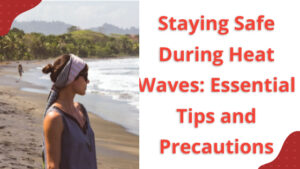Heat waves are becoming more frequent due to climate change, making it crucial to know how to safeguard yourself from their hazardous effects. Heat waves can lead to heat exhaustion, heatstroke, and even fatalities, exacerbating pre-existing health conditions. In this article, we will discuss various ways to protect yourself during heat waves, from understanding the risks and symptoms to practical measures you can take.
- Understand the Risks:
Heat waves occur when temperatures remain unusually high for an extended period, often lasting for a few days to a week. During these times, the air can become exceptionally dry, and humidity levels drop to dangerous lows. This can result in dehydration, heat exhaustion, and potentially fatal heatstroke if not addressed promptly.
- Recognize the Symptoms:
Knowing the symptoms of heat exhaustion and heatstroke is vital. Heat exhaustion may manifest as heavy sweating, weakness, cold and clammy skin, a rapid, weak pulse, nausea or vomiting, and fainting. Heatstroke symptoms include a body temperature above 103°F, hot and red skin, a rapid and strong pulse, headaches, dizziness, nausea, confusion, and unconsciousness.
- Stay Hydrated:
One of the most crucial steps in protecting yourself from heat waves is staying hydrated. When your body sweats, it loses water, leading to dehydration. Ensure you drink plenty of water, aiming for at least eight glasses daily. During heat waves, it’s essential to increase your water intake even further. Avoid sugary drinks, caffeine, and alcohol, as they can contribute to dehydration.
- Stay Cool:
Another important measure is to stay cool. Avoid being outdoors during the hottest parts of the day, typically between 10 a.m. to 4 p.m. If you must go outside, wear lightweight, light-colored, and loose-fitting clothing, along with a hat. Use sunscreen with a high SPF to shield your skin from harmful UV rays and seek shade whenever possible.
- Seek Air-Conditioned Spaces:
Whenever possible, spend time in air-conditioned spaces during heat waves. This could be your home, workplace, or public places like libraries or shopping malls. If your home lacks air conditioning, consider visiting a cooling center or public space with air conditioning. Although fans can provide some relief, they are less effective than air conditioning in extreme heat.
- Take Cold Showers or Baths:
Taking cold showers or baths can help cool down your body. The water does not have to be ice-cold, but it should be cooler than your body temperature. This will aid in lowering your body temperature and reducing the risk of heat exhaustion or heatstroke.
- Opt for Light Meals:
During heat waves, opt for light, refreshing meals such as salads, fruits, and vegetables. Heavy meals can make you feel sluggish and increase your body temperature, adding to your discomfort. Avoid consuming spicy, salty, or fatty foods, as they can also contribute to higher body temperatures.
- Check on Vulnerable Individuals:
Lastly, check on vulnerable individuals during heat waves, especially the elderly, young children, and those with pre-existing health conditions. Ensure they stay hydrated, remain cool, and take necessary precautions. If you know someone without air conditioning, offer to take them to a cooling center or a public space with air conditioning.
By following these tips, you can reduce your risk of heat-related illnesses and stay safe during hot weather. Keep in mind that some people are more susceptible to heat wave effects, such as the elderly, young children, pregnant women, and those with pre-existing health conditions. If you fall into one of these categories, take extra precautions during heat waves and consult your healthcare provider if you have any concerns.
Additionally, staying aware of weather forecasts and warnings is essential, as many regions have heat wave warning systems in place. Signing up for these systems and staying informed about weather conditions in heat-prone areas can provide crucial safety information during extreme temperatures.
In conclusion, protecting yourself from heat waves involves a combination of awareness, preparedness, and sensible precautions. By staying hydrated, keeping cool, seeking air-conditioned spaces, taking cold showers, consuming light meals, and checking on vulnerable individuals, you can minimize your risk of heat-related illnesses and stay safe during scorching weather. Remember to listen to your body and take breaks if you feel fatigued, dizzy, or unwell.


